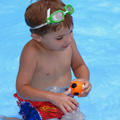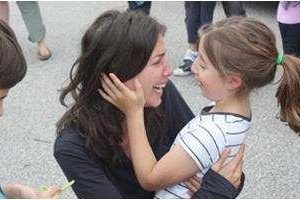
When “It’s for their own good,” Really isn’t.
Being a role model can be tough, especially when it comes to food and body image. We live in a society that idolizes skinny bodies for women and muscular physiques for men and it’s very easy to feel like our own bodies just don’t measure up.
What’s really tragic is the number of kids who are feeling enormous pressure to live up to the unrealistic images they see in the media on a regular basis. Studies reveal that 25% of 7 year olds are putting themselves on diets and 81% of 10 year olds are terrified of getting fat.
As a body image advocate, I regularly hear from worried parents, wanting to know what they can do to build their children’s self-esteem in a world where they’re constantly being told they just aren’t good enough. Luckily, there is a lot that parents can do to empower their kids with the confidence they deserve.
The MOST important thing we can do as parents is to make sure the messages our kids are getting from home are positive and encouraging. We need to be careful not to let any fears or insecurities we may have about food get passed on to our kids. It’s also important to make our homes “Fat-Talk Free” zones and insist that anybody who visits or spends time with our kids respects and follows this rule. Kids have to grow up understanding that the best bodies are healthy ones and how their bodies work is far important than how they look.
One question I often get from concerned parents deals with their frustration over the unintentionally critical comments well-meaning relatives aim at their children concerning weight.
Michelle, a mother of 2 shared: “I can remember being 6 or 7 years old and spending the weekend with my grandparents. I heard my grandfather tell my grandmother that I had to stop eating so much or I’d get fat. My grandmother agreed. It may sound crazy, but it was a defining moment for me because these were people who were supposed to love me unconditionally but were acting like I wasn’t good enough the way I was. I still tear up thinking about it now.”
Our family and friends aren’t trying to hurt our kids’ self-esteem and often think they are helping by “just being honest”. They need to understand that shame is never a good motivator and won’t be tolerated around your children.
A few tips on how to deal with relatives, negative comments and kids:
- Be honest and firm. Simply say something like, “We all love Sarah and want her to grow up loving herself and her body so we don’t allow any negative fat talk in our house. I’m sure you understand.”
- Don’t worry about offending anyone. They’ll get over it. The most important thing to do is protect your child. The more consistent you are in your rules, the more likely it will be for family and friends to understand. Eventually.
- If a comment is made in front of your child, deal with it immediately. This isn’t to start an argument, but since you can’t unsay what’s already been said, it’s important to replace the negative comment with your own positive one as quickly as possibly.
Our kids need as much love and support around them as possible. If we want to raise happy, healthy kids we need to work together to make it happen.
Try this:
Ask your kids to think of people they look up to. These should be people who have had a positive impact on others because of things they’ve done and not how they look. Have them find pictures of these people when possible or write their names on a list. Now you do the same. This can be done right away or over several days. When you’re ready, share your lists. Talk about your choices and why these people are important. It’s a great way for your kids to see that true role models are admired for who they are, not how they look. Let them know that while having strong role models is important, it’s also equally to grow up and become them ourselves.
Marci Warhaft-Nadler is a body image advocate and author of “The Body Image Survival Guide for Parents: Helping Toddlers, Tweens and Teens Thrive”. As Founder of the Fit vs Fiction workshops, she travels to schools empowering kids with the tools they need to tune out negative messages and grow up with the self-confidence they deserve. Contact her at marciwarhaft@rogers.com or facebook.com/visitfitvsfiction
Did That Help!? You Might Like These:
 |
 |
 |
| The Benefits of Swimming Lessons |
Should Your Little Athlete Take a Break? |
How to Motivate Your Child |


